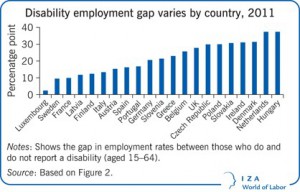 Anti-discrimination legislation has been largely ineffective at improving the employment prospects of the disabled. A new report, just published by IZA World of Labor, finds that despite the introduction of a range of legislative and policy initiatives designed to eliminate discrimination and facilitate work, disability is still associated with substantial and enduring employment disadvantages.
Anti-discrimination legislation has been largely ineffective at improving the employment prospects of the disabled. A new report, just published by IZA World of Labor, finds that despite the introduction of a range of legislative and policy initiatives designed to eliminate discrimination and facilitate work, disability is still associated with substantial and enduring employment disadvantages.
Author of the report Melanie Jones (Cardiff University) states:
“There is no consistent evidence that anti-discrimination legislation has improved the labor market outcomes of disabled individuals.”
Key points of the report:
- Across European countries, one in eight working-age individuals (aged 15–64) report disability as defined by a long-term health problem.
- There is evidence of a substantial and enduring disability employment gap (average of 20 percentage point difference between disabled and non-disabled persons).
- There is little evidence that legislation prohibiting disability discrimination has led to a narrowing of the disability employment gap.
- Employers are crucial in supporting flexibility and adjustments to work to enable employees with a disability to retain or recommence employment.
- Government policies and welfare systems should support reentry/entry into the workforce for people with disabilities.
 Understanding the work-related well-being of disabled workers is not only important in its own right, but also because of its likely contribution to the employment and earnings gaps via the impact on the recruitment, retention and productivity of disabled individuals. It is also important to note that differences in the type, severity and chronicity of disability are fundamental to the pattern of disadvantage experienced, and are therefore also critical to the design of effective support mechanisms.
Understanding the work-related well-being of disabled workers is not only important in its own right, but also because of its likely contribution to the employment and earnings gaps via the impact on the recruitment, retention and productivity of disabled individuals. It is also important to note that differences in the type, severity and chronicity of disability are fundamental to the pattern of disadvantage experienced, and are therefore also critical to the design of effective support mechanisms.
Jones advises that the importance of the employer (and effective occupational health) is recognized in supporting flexibility and adjustments to work in order to enable employees to keep their jobs, or recommence employment. The government also plays an important role in this regard, by providing incentives for employers to retain disabled workers and by designing welfare systems that support working disabled individuals rather than schemes which provide permanent support conditional on not working. The broadening of permitted employment and/or the provision of temporary financial support to facilitate work-related adjustments would provide greater incentives for disabled individuals to remain in work, or return to work, when they are able.